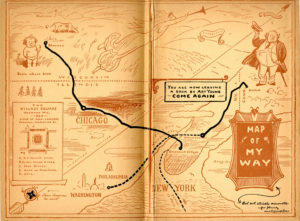by Henry Farrell on February 11, 2019
[The below text is a short memo I presented for a workshop on a left-liberal financial foreign policy for the US last week.]
The US left is starting to come to grips with the relationship between democracy and inequality. This builds on a variety of academic work over the last several years – most prominently Thomas Piketty’s book, but also work by other academics such as Emmanuel Saez and Gabriel Zucman – which maps the growth in wealth and income inequality across rich countries, and how marked it has been in market-liberal countries such as the US. But these are no longer academic debates: they are being taken up by politicians within the Democratic party, creating a new dynamic of intra-party competition. Proposals by left-leaning politicians such as Bernie Sanders and Elizabeth Warren are not only notable in themselves, but in how they are shifting the center of gravity, so that more centrist politicians too are taking them up. [click to continue…]
by John Holbo on February 11, 2019
I’m done with Art Young, but I had an afterthought. My final quote from Young mentioned earlier imaginative greats – like Jacques Callot. In my experience, everyone knows about Hieronymous Bosch but, oddly, fewer are familiar with Callot. So I uploaded one of his more impressive pieces to Flickr (I just snagged it from Wikimedia). I can’t say it’s Seussian, exactly. But it’s pretty great old stuff. From 1635.

by Chris Bertram on February 10, 2019
by John Holbo on February 9, 2019
Governor Ralph Northam is fighting to stay, so he says, because the alternative is being unfairly tarred for life as a racist. (Sorry, I can’t find the quote. Correct me if I’m wrong. But somewhere in this blizzard of articles on the controversy he has said something to that effect. He is obviously thinking it.) This is so backwards. The correct solution is he should leave and, on the way out the door, he gets sympathy for his political misfortune and … yes, forgiveness and absolution. Go, and sin no more. But go.
He needs to leave, not because of what is or isn’t in his heart – or was or wasn’t in his heart – but because his continued presence makes it impossible for Democrats to take a strong, consistent, stand against racism. If any Democrat knows that, by staying in office, they hinder – rather than helping – he or she should step back for the good of the party, on behalf of the values it stands for. That said, there is no reason on earth to doubt that Northam is a different man from the one in that picture. Morally. It’s common sense – not just common courtesy – to believe he’s changed and would not do that today because he knows better. (That guy in the picture was a Gillespie voter, for sure.) [click to continue…]
by John Holbo on February 6, 2019
Today I conclude my reflections on Art Young, occasioned by the great new book about him [amazon associates link]. For those disinclined to purchase, I found a copy of one of his books, On My Way (1928), in free PDF form. (Doc announces itself as legal. No copyright renewal, so it seems.) Anyway, in honor of my earlier, literary maps post: say! the endpapers make a swell map!

But the Art path I shall trace in this post is not from Monroe, WI, to Bethel, Conn. A few years back I published a survey article on ‘caricature and comics‘. On the one hand, caricature is a minor art form – not necessarily low but distinctly niche. Funny line drawings of celebrities. On the other hand, formally, caricature is very old and very broad. This produces categorial dissonance. Caricature techniques are at the root of styles we don’t think of as caricature. This is the main thesis of Gombrich’s Art and Illusion, by the by. (No one seems to have noticed, but it’s true.)
In that essay I make some points with reference to the case of caricaturist-turned-Expressionist, Lyonel Feininger, but I could have used Art Young.
But let me start at the beginning, regarding Young. I like reading stories of youthful artistic influence, so here is his, pieced together from the new book and other sources. [click to continue…]
by Harry on February 3, 2019
I’ve pretty much accepted that brexit of some form will happen, and the task for responsible MPs now is to make it as soft as possible. That includes leaving in name only — thus preserving free movement of peoples. If the brexiteers want to end immigration let them propose a referendum on that. I’ll do a separate post on the plot to split to leave the Labour Party (soonish, maybe).
So, if it is going to happen, can we have a campaign for an appropriate song to campaign for being #1 on March 29th? The problem is, which one? My suggestions reveal when I stopped listening to new music, which revelation will surprise no-one — but your suggestions can widen the scope.
I do have a genuine, serious, suggestion, which I’ll make later, and maybe someone will bring it up here, but for now, let your imaginations run away with you.
A few of my suggestions (some are obvious, some are ironic, some quite oblique, but the British are renowned for their enjoyment of enigmatic tests, so they’d be able to work them out — think of it as a large-scale version of Round Britain Quiz):
Sex Pistols: Anarchy in the UK
TRB: Power in the Darkness
Pink Floyd: The Post War Dream
Pink Floyd: We Don’t Need No Education (one of exactly 3 songs I can remember my dad singing around the house in my youth).
The Double Deckers kids: Get On Board
Flanagan and Allen: Underneath the Arches
Leon Rosselson: Palaces of Gold
Stiff Little Fingers: Alternative Ulster
Bucks Fizz: Making Your Mind Up
Queen: We are the Champions
Bruce Springsteen: Born in the USA
Jake Thackray: The Brigadier
Wings: Band on the Run
Deep Purple: Smoke on the Water
Well, you get the idea….
by Chris Bertram on February 3, 2019
by Harry on February 1, 2019
When I reached my late thirties I became very anxious about the possibility that I would never find anyone my age or younger funny. At the time, all the comedians I loved were considerably older than me and, for the most part, I’d liked them for years. I did, always, hold in my head that slender woman with long hair who had driven me and a bunch of Trots into fits of laughter sometime in the late 80’s and who had to be around my age.
I had missed the comedy boom in the UK (driven by people around my age) because I was out of the country, and foreign media culture was inaccessible in the States. (And, I’m sorry, but I struggle to think of an American television or radio show that I find funny — even Roseanne, which was entirely brilliant, wasn’t really brilliant because it was funny). Of course, now, I’ve learned to my relief that young(ish) people can be really funny, and I feel entirely relaxed about living a long life if that’s what fate has in store. The first step was first listening to Jeremy Hardy on The News Quiz, and, after a long time of finding him hilarious and lovable, discovering that he was about 15 years younger than his comic persona — only a couple of years my senior! And then that he was friends with Linda Smith who was also 15 years younger than her comic persona! I sometimes wondered whether you had to (roughly) share his politics to find him funny: my evidence against this is that my friend from secondary school who says she’s voted for every major political party loved him as much as I do and, now, Hugo Rifkind’s charming twit.
Here are two of my favorites. FIrst, Jeremy Hardy singing Hallelujah in the style of George Formby.
And here he is chatting with Mark Steel. A long, rambling, chat about fame.
If, as I doubt, there is an afterlife, it has become a much more realistic utopia, much funnier, and enormously less tuneful, in the past couple of weeks.
by Maria on January 31, 2019
London is the city of leaving do’s. There’s a real push on to get out before it all gets worse. This morning I was chatting with a Swedish friend who leaves on Tuesday, telling her how much freer and more energetic she’ll feel once she’s not carrying around the mental load of daily FUD that comes from just living here, now. My friend cut across the faux cheery bullshit and said “I don’t feel safe here, any more. There’s no limit to what they can do.”
There’s a conversation I’ve had with several British friends. We’ll all be moaning about Brexit affecting us and how the UK’s dysfunctional politics means there is no way to express this electorally, and then they’ll say; “But you’re lucky. At least you can leave.” [click to continue…]
by Harry on January 31, 2019
I’ve started writing occasionally for the Association of College and University Educators. The posts will probably recapitulate a lot of themes from my blogging about teaching and learning here at CT, but for a different audience. Here is the first post, about making fruitful classroom discussions happen. Here’s a taster:
All teachers experience a tension between the need for engagement and the need for rigor. Without rigor, the students won’t learn what we want them to; without engagement, they won’t learn anything at all. In the classroom, the best way to guarantee rigor is for the professor to do all the talking—this is how they delude themselves that the class is going well. Unfortunately, this is also the best way to ensure complete disengagement, leading to torpor when we do try to stimulate discussion.
I decided to write it because I said something to the effect of the above paragraph in class recently, and a student stared at me, as if having an epiphany, and said “Do you explain this to students?”; it occurred to me that I don’t even say it to other teachers!
by Harry on January 29, 2019
I told you that in the coming days you’d be able to learn a lot about Erik’s ideas, if you wanted. Well, there are now 4 pieces at Jacobin by Erik’s former students and friends that, between them, tell you a great deal about his ideas, but also about how he was in the world. Vivek Chibber explains why Erik was a Marxist and, perhaps, more orthodoxly so than some people think. David Calnitsky gives you a sense of what Erik was like as a teacher. Elizabeth Wrigley-Field talks about how he conducted himself professionally around others. This story of David’s illustrates both his goofiness and his understanding that successful teaching depends, partly, on the right kind of relationship:
I attended an undergraduate lecture of his once, and at the beginning of class he reported that there was a student in his office hours who expressed being intimidated by him. He responded in class by showing childhood pictures – pictures of him at seven in a cowboy hat, pictures with his siblings.
And, having read that, this comment of Elizabeth’s won’t surprise you:
At the annual sociology meeting last August, when I knew he was sick but did not believe he would have so little time left, a few of us former students were talking about him. I commented that Erik was always exactly himself.
Then I thought about it a bit more, and I revised my remark. A lot of people — especially a lot of men — are “themselves” in a way that forces the people around them to conform: we all are supposed to contour ourselves around however they are. But Erik was the opposite of that: he was always really himself in a way that invited all of us to be ourselves, too.
And Michael Burawoy writes a long, beautiful, essay, combining an exposition of Erik’s ideas — his intellectual contribution — with the story of his life, and showing how well the two fit together.
And Here is a neat autobiographical essay with which Erik prefaced one of his later books. And, for that matter, here’s an enormous list of pdfs of his published writing.
by John Holbo on January 28, 2019
I don’t have time for a full appreciation of Art Young today, but I’ll re-recommend the new Fantagraphics book about him [amazon associates link] and advance one art historical thesis: Young was a significant influence on the style of Dr. Seuss. I have never seen this point made before. I didn’t realize it myself until a week ago. As an avid, amateur Seussologist, and student of lines of graphic influence in American cartoon art in the early 20th Century, I’m interested to see it. [click to continue…]
by Chris Bertram on January 27, 2019
by John Q on January 27, 2019
A study of fake news on Twitter Facebook has found that the biggest propagators are Republicans over 65. No surprises there, but the researchers muddy the waters by suggesting that this group is prone to believing and spreading lies because they are “digital immigrants”, rather than “digital natives”, a distinction I thought had disappeared.
A moment’s thought should have suggested a different interpretation. The same group, after all, constitutes the primary audience for Fox News and (globally) the core readership of the Murdoch press. Even before the emergence of a distinctively partisan rightwing media, evangelicals eagerly spread fake news by word of mouth.
And this study defined fake news in the narrow sense covering reports that Obama is a lizardoid Muslim and similar. A more accurate definition, encompassing deliberate denial of overwhelming evidence, would encompass the entire rightwing media universe, going beyond the Murdoch press to include the output of thinktanks like AEI, Cato, Heritage and Heartland. The extreme cases studied on Twitter are the core of an onion wrapped in multiple layers of denial and defense mechanisms.
Until recently, the most obvious case was that of climate change, but now they have Trump. It’s now impossible to survive on the right without giving Trump a pass for his thousands of glaring lies. In these circumstances, it’s scarcely surprising that Republican activists who have been steeped in this environment for decades. see it as virtuous to circulate talking points regardless of their truth or falsity. Far from misleading this cohort, Twitter Facebook simply provided them with an amplifier.
by John Holbo on January 27, 2019
I got on Twitter.
Honestly, I deserve some credit. I joined a couple years back because, suddenly, every time I landed on any Twitter page it was all in Arabic. Weird. I figured if I signed in I could adjust the language setting. But then the problem resolved itself. I never bothered. But I follow enough people I should be on the platform, but if I’m on the platform … So I logged in. Erased the Arabic script handle Twitter had wisely chosen as my default. Reset my country of origin from the default: Hungary. And Bob’s your uncle!
So what do we think of the ethics of Twitter? I mean: how can one live a flourishing life on Twitter?
It’s just the worst, right? I’ve made a terrible mistake.




